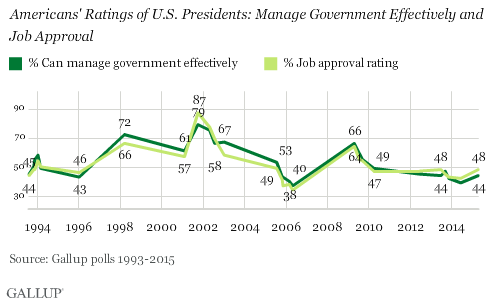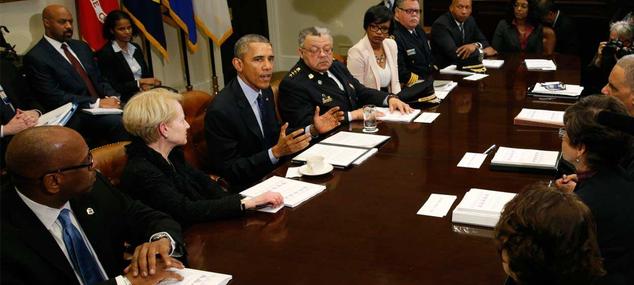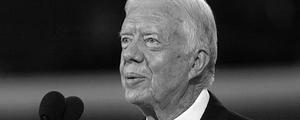Story Highlights
- Americans' ratings of presidents as managers reflect job approval
- 44% of Americans most recently say Obama can manage effectively
- Clinton, Bush and Obama show similar patterns
PRINCETON, N.J. -- Most Americans believe that managing government effectively is an important requirement for a good president, and in recent years, sitting presidents' ratings on this trait have closely matched their overall job approval ratings. Currently, 44% of Americans say that President Barack Obama is an effective manager of government, while 48% approve of the job he is doing overall.

The ability to manage government is clearly important to Americans, and previous Gallup research has shown that Americans cite management as one of the top qualities they desire in a president. Gallup has asked Americans from time to time to rate the three most recent presidents -- Bill Clinton, George W. Bush and Barack Obama -- on their ability to manage government effectively, asking the most recent question about Obama in an April 9-12 survey. The accompanying chart displays the resulting data, along with the job approval rating for the president each time Gallup asked the management question. Clearly, when presidents are doing better on the general job approval measure, as Clinton was in 1998 and as George W. Bush experienced in 2001 and Obama in 2009, they also do better in perceived performance as managers of government. Likewise, when one measure has dipped, so has the other.
Americans' ratings of Obama on the managing government dimension have varied between 66% when he first took office to 39% in the summer of 2014, but in each instance, his contemporaneous job approval rating was within four percentage points of his management score. This gap between views of Clinton and Bush as effective managers and their overall job approval ratings from survey to survey varied more than has been the case for Obama, but reflected the same general pattern. For example, while 79% of Americans said that the label "can manage government effectively" applied to George W. Bush in October 2001, just after 9/11, his job approval rating at that time was also very high, at 87%. When Bush's rating on the management dimension plummeted in 2006, his job approval rating also fell. Clinton's high mark on being an effective manger of government, 66%, came in 1998, a time when his job approval rating was a similarly high 72%.
Overall, the average 52% of Americans who have since 1993 given presidents credit for managing government effectively is only one point different from the 51% average approval rating for the three presidents across the same surveys.
Recent Presidents and Candidates Have Varied Management Experience
That the most recent presidents -- including George W. Bush, Bill Clinton, Ronald Reagan and Jimmy Carter -- have been state governors, could suggest that Americans appear to want a president with managerial and executive experience. In addition to having been governor of Texas, Bush was also the only president in history to have earned an MBA and was involved in the business world with an oil company in west Texas and as managing general partner of the Texas Rangers major league baseball team.
Still, Americans gave neither Bush nor Clinton more credit for being good managers than they have given Obama, who did not share a state executive background.
Additionally, in the 2012 election, Obama's four years as president ended up trumping candidate Mitt Romney's credentials as a CEO, president of the Salt Lake Organizing Committee for the Winter Olympic Games and Massachusetts governor. Thus, it is difficult to say if prior management experience has a direct bearing on a candidate's probability of being elected president. But it does appear that once in office, Americans use a president's perceived management of government as a criterion for evaluating his overall job performance, rather than viewing management as a separate presidential dimension.
Implications
News story after news story in recent years has focused on apparent governmental managerial wrongdoing in the execution of its responsibilities, including the latest reports of vast cost overruns in the Veterans Affairs' efforts to construct a new facility in Colorado. Americans also cite dysfunctions in the way the government operates as the most important problem facing the country today. There would thus appear to be a strong public appetite for a president who is an effective, efficient manager of government.
The recent record shows that Americans do not tend to differentiate presidents in either an unusually positive or a negative way on their ability to be effective managers, giving presidents ratings on this dimension that basically mirror their overall job approval ratings. This underscores that Americans consider being an effective manager of government as a fundamental requirement for being a good president. Whether Americans are basing their approval of the president at any given time on the state of the economy, the budget, relations with Congress or foreign affairs, they seem to equate good presidential performance with effective management, and vice versa. Americans' perceptions of the president as a good manager are thus a component of how they will evaluate him or her. This suggests that the large group of individuals lining up as 2016 presidential candidates could stress the need for good governmental management as a key part of their efforts to become the next president.
Survey Methods
Results for the most recent Gallup poll cited in this research are based on telephone interviews conducted April 9-12, 2015, with a random sample of 1,015 adults, aged 18 and older, living in all 50 U.S. states and the District of Columbia. For results based on the total sample of national adults, the margin of sampling error is ±4 percentage points at the 95% confidence level. The results for each of the other points in time represented in the research are based on individual surveys, most with samples of approximately 1,000 national adults, and most with a margin of sampling error of ±4 percentage points at the 95% confidence level. All reported margins of sampling error include computed design effects for weighting.
Each sample of national adults includes a minimum quota of 50% cellphone respondents and 50% landline respondents, with additional minimum quotas by time zone within region. Landline and cellular telephone numbers are selected using random-digit-dial methods.
View complete question responses and trends.
Learn more about how the Gallup U.S. Daily works.

